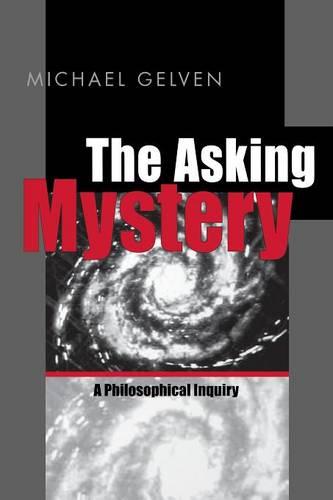Overview
How do we ask the great questions? What does it mean to ask so profoundly? What does it mean for us to ask at all? Michael Gelven confronts these questions as he explores humans as self-reflecting thinkers. He recognizes two central phenomena as fundamental: the recognition of our own possibility lying within our existence and the realization of our suspension between total ignorance and complete knowledge. Using concrete analyses, Gelven investigates the questions we ask that may seem initially unanswerable but are ultimately confronted through our own self-realization. Asking becomes fundamental when we shift from relying on projected schemes, such as clocks and calendars that enable answers to ordinary questions about time, to an ongoing, nonschematic reflection on our own existence. Not only are Platonic, Kantian, Nietzschean, and Heideggerian analyses considered, but so are David's psalms, Auden's poetry, and Shakespeare's plays. Gelven asserts that fundamental asking is essential to our being: we must ask greatly first, for the great explains the lesser; the small does not account for the large.
Full Product Details
Author: Michael Gelven (Northern Illinois University)
Publisher: Pennsylvania State University Press
Imprint: Pennsylvania State University Press
Dimensions:
Width: 15.20cm
, Height: 1.50cm
, Length: 22.90cm
Weight: 0.313kg
ISBN: 9780271019864
ISBN 10: 0271019867
Pages: 176
Publication Date: 15 April 2001
Audience:
General/trade
,
College/higher education
,
General
,
Undergraduate
Format: Paperback
Publisher's Status: Active
Availability: Out of stock

The supplier is temporarily out of stock of this item. It will be ordered for you on backorder and shipped when it becomes available.
Reviews
Philosophers have been inclined to see the proposition, the theory, the system as isomorphic to reality--hence substance metaphysics. Michael Gelven argues that propositions are answers to questions and that asking is more primordial than answering and has a worth independent of an answer conceived as a true proposition. This fundamental inversion makes possible many other thoughtful inversions that make the argument as it unfolds constantly challenging and continually stimulating. --Donald Livingston, Emory University
Philosophers have been inclined to see the proposition, the theory, the system as isomorphic to reality--hence substance metaphysics. Michael Gelven argues that propositions are answers to questions and that asking is more primordial than answering and has a worth independent of an answer conceived as a true proposition. This fundamental inversion makes possible many other thoughtful inversions that make the argument as it unfolds constantly challenging and continually stimulating. --Donald Livingston, Emory University Philosophers have been inclined to see the proposition, the theory, the system as isomorphic to reality hence substance metaphysics. Michael Gelven argues that propositions are answers to questions and that asking is more primordial than answering and has a worth independent of an answer conceived as a true proposition. This fundamental inversion makes possible many other thoughtful inversions that make the argument as it unfolds constantly challenging and continually stimulating. Donald Livingston, Emory University Philosophers have been inclined to see the proposition, the theory, the system as isomorphic to reality--hence substance metaphysics. Michael Gelven argues that propositions are answers to questions and that asking is more primordial than answering and has a worth independent of an answer conceived as a true proposition. This fundamental inversion makes possible many other thoughtful inversions that make the argument as it unfolds constantly challenging and continually stimulating. --Donald Livingston, Emory University Philosophers have been inclined to see the proposition, the theory, the system as isomorphic to reality hence substance metaphysics. Michael Gelven argues that propositions are answers to questions and that asking is more primordial than answering and has a worth independent of an answer conceived as a true proposition. This fundamental inversion makes possible many other thoughtful inversions that make the argument as it unfolds constantly challenging and continually stimulating. Donald Livingston, Emory University Philosophers have been inclined to see the proposition, the theory, the system as isomorphic to reality hence substance metaphysics. Michael Gelven argues that propositions are answers to questions and that asking is more primordial than answering and has a worth independent of an answer conceived as a true proposition. This fundamental inversion makes possible many other thoughtful inversions that make the argument as it unfolds constantly challenging and continually stimulating. Donald Livingston, Emory University Philosophers have been inclined to see the proposition, the theory, the system as isomorphic to reality--hence substance metaphysics. Michael Gelven argues that propositions are answers to questions and that asking is more primordial than answering and has a worth independent of an answer conceived as a true proposition. This fundamental inversion makes possible many other thoughtful inversions that make the argument as it unfolds constantly challenging and continually stimulating. --Donald Livingston, Emory University
Author Information
Michael Gelven is Presidential Research Professor at Northern Illinois University. He is the author of many books, including three books previously published by Penn State Press: Truth and Existence(1991), War and Existence (1994), and The Risk of Being: What It Means to Be Good and Bad (1997).



